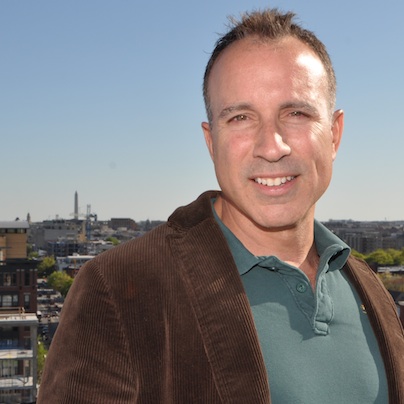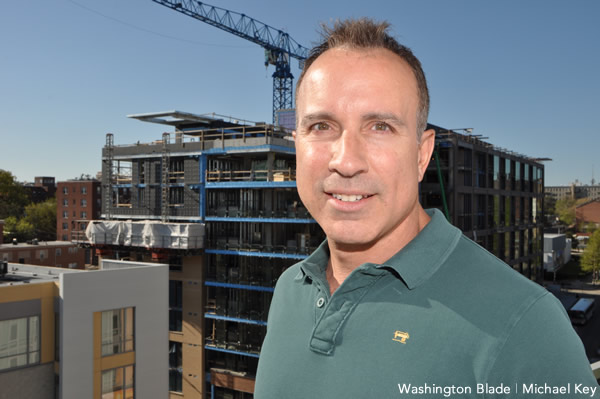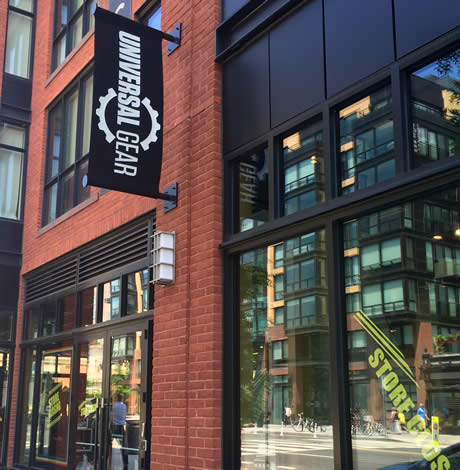Living
Helping transform city’s living landscape
Developer, Universal Gear owner Franco puts his passions to work

Last week was the anniversary of the 1968 riots in D.C., following the assassination of Dr. Martin Luther King, Jr., in Memphis. The ensuing five days of destruction that befell Washington and filled the sky with smoke scarred the city’s landscape for decades and cut a hole in the heart of commerce through the prominent local retail districts of the era.
Washington neighborhoods hollowed out by looting and fires are only now beginning to fully finish recovering as commercial and residential real estate development repurposes the remaining empty buildings and reconstructs many of the last vacant lots across a wide swath of the city. Nowhere has this transformation been more dramatic than along the 14th Street, N.W., commercial corridor, as it intersects with U Street and stretches northward into Columbia Heights.
It is in this area that long-time community entrepreneur and local businessman and real estate developer David Franco continues to have a significant impact on a still rapidly evolving landscape. Uppermost in his mind has been this guiding principle: “How can I impact the community by creating a positive environment and contribute effective change in a concentrated area?”
A Washington-area native and lifelong resident, Franco recalls his father vividly detailing the riots of 44 years ago. Now 47, he remembers the pride and gratitude in the recounting of customers driving to the family-owned clothing store in downtown Washington at 12th and G streets, now a Macy’s department store in the former Hecht’s building, to stand in front waving on potential looters. Appreciative of the years of dedicated customer service conveyed to generations of families, “not this place” they implored in defending the business. The store remained untouched throughout the extended melee of anger and frustration.
Franco grew up understanding firsthand the importance of providing attentive and personalized customer service and engendering this type of loyalty. He would later infuse his own business activities with building relationships in the marketplace. A strong sense of ethics, a spirit of community-mindedness and dedication to the client experience and product provided were to become the trademarks of his future endeavors.
Following a three-year stint at the University of Maryland where he studied architecture, business and urban affairs, Franco continued working with the family enterprise, a successful local chain of discount department stores, until 1989. It was then that he became one of the investors backing the management team at the iconic nightclub Tracks that would dominate the gay dance scene through the next decade. He also partnered with the group in opening Trumpets restaurant and lounge on the 17th Street dining and entertainment strip near Dupont Circle.
Soon after, during the April 1993 weekend of the national March on Washington for Lesbian, Gay and Bi Equal Rights and Liberation, Franco would launch a clothing and accessories store with then business partner and commercial interior designer Keith Clark.
Universal Gear, located above Trumpets in a street level retail space at the corner of 17th and Q streets, quickly skyrocketed in popularity, outfitting many a gay man casually attired for work, play or the gym. The store would soon expand into a second level, nearly doubling in size with a complete interior renovation and striking new layout.
Franco would later explore market opportunities with since discontinued stores in Atlanta and Chicago’s Boystown, as well as opening a thriving Manhattan store in the heart of Chelsea and another in Rehoboth Beach. Universal Gear is adding a second New York location early next month in the trendy Hell’s Kitchen midtown west neighborhood at 9th Avenue and 49th Street.
In tandem with his development activities in the 14th and U area and following his customer base eastward, the local Universal Gear relocated to 14th and P streets in November 2007, becoming an expansive new neighborhood retail anchor.
Franco had earlier discovered that his passion for architecture and urban planning would lead him to residential real estate development, first renovating and marketing a 12-unit condo building on Chapin Street in Columbia Heights with business partner Jeff Blum, with whom he co-founded Level 2 Development. Excited by the then-booming pre-recession housing market, they started looking around for additional opportunities and set their sights on developing a larger project.
A Scorpio, Franco admits to “loving a challenge.”
This led Franco and Blum to undertake one of the largest and most prominent residential development projects along 14th Street.
Located at Florida Avenue and standing as the gateway at the sloping incline into adjoining Columbia Heights, the massive View 14 building and its 185 rental units and 30,000 sq. ft. of ground floor retail space – replacing an auto repair garage and an unattractive array of satellite dishes and communication towers – became a harbinger and symbol of extensive change in the area. David calls one of the penthouse units with a south-facing pinnacle terrace overlooking the area home.
Construction cranes are once again jutting into the sky along the high-density thoroughfare. The outline of a large glass-clad apartment building across the street from View 14, originally designed by Level 2 and subsequently sold to another firm for construction following initial planning, is quickly progressing toward completion.
Level 2 Development will next begin construction of a 144-unit studio and one-bedroom apartment project on 14th Street at Wallach Place, only steps south of U Street. Groundbreaking for the yet to be named project, located at 1919 14th St., will signal the Level 2 duo’s next project in the District, undertaken in association with Keener-Squire Properties.
The long road to project approval was not an easy one, according to Franco. He compares the process to the infamously cumbersome regulatory obstacles experienced by restaurant and bar owners under the city’s liquor licensing regimen.
Acknowledging that some neighborhood residents are often skeptical regardless of the track record of a local business, he notes that an “overabundant sense of empowerment” by small numbers of frequently ill-informed neighborhood opponents of change and small citizens groups requires advance calculation of the substantial expense for both hard and soft costs related to project delays and extensive round-robin negotiations. This results in higher rental or sale prices and can endanger project viability.
Underscoring how challenging a place the District can be to conduct business, Franco longs for local entrepreneurs to be respected as shared stakeholders. He points out that better cooperation would yield greater benefits for all.
Franco does not hesitate to confirm that a new ethos has taken hold for housing construction and resident lifestyles in the most vibrant and developing areas of the city. “We’re betting the ranch on it,” he offers, describing a distinct consumer preference for smaller home environs with modern finishes and amenities designed for a diverse demography drawn to a life largely experienced outside the front door.
“That’s how we live now,” he adds, identifying retail stores and shops of all types, dining and entertainment destinations and social watering holes as current interactive magnets and contemporary gathering places. Franco points out that demand for such community spots will likely continue to outpace capacity as the area – already experiencing the city’s greatest growth and a dramatic recent double-digit percentage population increase – adds more than 3,000 new residents in the next year.
Despite the business hurdles and regulatory obstacles, Franco remains committed to pursuing additional projects and public/private partnerships with and in the city he loves and lives. Enlivened by the development process and passionate about the results is what continues to motivate and inspire his efforts to play an ongoing role in the creation of a livable and engaging urban environment.
Mark Lee is a local small business manager and long-time community business advocate. Reach him at [email protected].

As the days grow longer and buyers re-emerge from winter hibernation, the spring market consistently proves to be one of the strongest times of year to sell a home. Increased inventory, motivated buyers, and picture-perfect curb appeal make it a prime window for homeowners ready to list.
The good news? Preparing your home for spring doesn’t require a full renovation or a contractor on speed dial. A few thoughtful, cost-effective updates can dramatically elevate your home’s appeal and market value.
Here are smart, inexpensive ways to get your property market-ready:
Fresh Paint: The Highest Return on a Small Investment
Few improvements transform a home as quickly and affordably as paint. Neutral tones remain the gold standard, but today’s buyers are gravitating toward warmer tan hues that create an inviting, elevated feel without overwhelming a space. Soft sandy beiges and warm greige-leaning tans provide a clean backdrop that photographs beautifully and allows buyers to envision their own furnishings in the home.
Freshly painted walls signal care and maintenance — two qualities buyers subconsciously look for when touring properties.
Removable Wallpaper: Style Without Commitment
For homeowners wanting to introduce personality without permanence, removable wallpaper offers a stylish solution. A subtle textured pattern in a powder room, a soft botanical print in a bedroom, or a modern geometric accent wall can add depth and character. Because it’s easily removed, it appeals to both sellers and buyers — creating visual interest without long-term risk.
Upgrade Light Fixtures for Instant Modernization
Outdated lighting can age a home instantly. Swapping builder-grade fixtures for modern, streamlined options is one of the simplest ways to refresh a space. Consider warm metallic finishes or matte black accents to create a cohesive, updated look. Proper lighting not only enhances aesthetics but also ensures your home feels bright and welcoming during showings.
Elevate Curb Appeal: First Impressions Matter Most
Spring buyers often decide how they feel about a home before they ever step inside. Refreshing curb appeal doesn’t require major landscaping. Simple updates such as fresh mulch, trimmed shrubs, seasonal flowers, a newly painted front door, and updated house numbers can dramatically improve first impressions. Power washing the driveway and walkways also delivers a clean, well-maintained appearance for minimal cost. Even if you don’t have a curb to appeal- think potted plants on your patio, balcony and change out your door mat.
Deep Clean & Declutter (Seriously, It Matters)
A deep, top-to-bottom cleaning is basically free and one of the most impactful things you can do. Scrub floors, windows, grout, baseboards, appliances, bathrooms, and everything in between. Don’t forget to clean windows inside and out — natural light is a huge selling point. Declutter by packing up excess stuff, clearing off countertops, and minimizing personal items so buyers can see the space, not your life.
Let the Light Shine
Make your home feel bright and inviting by cleaning windows, opening blinds, and replacing dark or dated light fixtures with contemporary, budget-friendly options. Swapping in LED bulbs offers brighter light and lower utility costs — a small change that buyers appreciate. Pro tip: I always recommend removing widow screens to allow as much light in as possible
Neutralize Scents
Make sure the home smells fresh. Neutralizing odors — whether from pets, cooking, or moisture — creates a clean, welcoming atmosphere. Light natural scents like citrus or subtle florals can be inviting during showings. Think of how your favorite hotel smells and go for that.
Spring market rewards preparation. By focusing on high-impact, low-cost improvements, sellers can position their homes to stand out in a competitive environment. With thoughtful updates and strategic presentation, homeowners can maximize both buyer interest and potential sale price — all without overextending their renovation budget.
As activity increases and inventory begins to rise, now is the time to prepare. A little polish today can translate into significant results tomorrow.
Justin Noble is a Real Estate professional with Sotheby’s International Realty Servicing Washington D.C., Maryland, and the beaches of Delaware.
Advice
Dry January has isolated me from my friends
Is it possible to have social life without alcohol?

Dear Michael,
Some of my friends and I decided to do Dry January.
The six of us are a posse, we’ve been friends for years. Many boyfriends and even a husband or two have come and gone but we get together all the time and travel together.
I think we all agreed that drinking is too big a part of our social lives and thought we’d give Dry January a shot.
So … I am feeling better and it’s only been three weeks.
I’ve actually lost a little weight, and it’s nice not to wake up with a hangover four mornings a week. I’m pushing 40 and no surprise, my body feels relieved.
But, I’m also the only one of us who is still doing it.
Which means they are all going out and I am not. So I am feeling lonely.
I could join them in going out but first of all, I don’t really want to hang out with them when they’re drunk and I’m trying to be alcohol free; and also, there’s a part of me that is afraid I will give in to temptation and have a drink. And then it will be back to business as usual.
But, I spent this past weekend, and every night this week, alone.
All of this has me thinking: what do I do in February? I really don’t want to start drinking again.
But, if I don’t, how do I stay part of my friend group? If they’re buzzed (or drunk) and I’m not, am I still going to fit in?
I’m disappointed in my friends. We were all in this together, I thought, but one thing after another came up for them.
Some special event where “everyone was drinking,” a work dinner where “I didn’t want to deal with everyone’s questions about why I wasn’t drinking,” “too much work stress not to have a martini,” etc. In the end they were all laughing about it and now they’re basically poking fun at me and essentially betting how long I will last. That doesn’t feel good. It’s like the whole thing was a whim or a joke to them.
Also, heavy alcohol use is pretty typical of our community. If I’m not drinking then how do I have a social life?
Appreciate your thoughts.
Michael replies:
It can be hard to be different. For example, to be gay in a straight world, or not to drink in a world where alcohol plays such a big part.
I’m a believer in living in a way that respects whom you actually are. This means doing what you think is important to do, even when there are consequences you don’t like. Only you can decide the boundary where the consequences of your living with integrity become intolerable.
Yes, many gay men drink a lot. So if you decide you don’t want to hang out where alcohol is involved, you will be reducing your options for socializing.
Some possibilities:
- Discuss this situation with your friends. Ask them if they’re willing to spend some time with you and without alcohol. (Not all the time — that would be way too much to ask, given that they clearly enjoy drinking.) Perhaps if you explain why your request is important to you, they’ll be willing to lean in your direction at least some of the time. That they’re now mocking you for not drinking suggests I am a bit too optimistic about this possibility. But who knows? And, what have you to lose by asking?
- See if you can tolerate hanging out with people who are drinking without picking up a drink yourself, and if you can actually enjoy such interactions.
- Start looking for some new friends. There are, in fact, lots of gay men in this world whose social lives don’t revolve around alcohol (or other substances.)
On a separate but related note: given your fear that you will start drinking again, and your concerns about navigating life without alcohol, might you consider Alcoholics Anonymous to get some support?
I’ve seen AA and other 12-step groups help many friends and clients, and I think they work in two main ways.
First, attending meetings gives you support and a feeling of community. You’ll meet others who are working to be sober, hear their stories and share your own struggles with them. You’re likely to feel less alone in your effort to stop drinking, learn tools for staying sober, and make friends you can reach out to when you’re feeling vulnerable. You’ll also have a sponsor, your guide and advocate in the program, whom you talk with regularly.
Second, the program lays out “12 steps” of recovery that are a path to greater self-awareness and personal growth. Like good psychotherapy, the steps give you a framework for looking at your behavior patterns and taking responsibility for yourself.
If you are intrigued, the best way to learn more is to attend several 12-step meetings. There are many in our area, including gay groups (for example, the Triangle Club.) As I mentioned, if you do get involved in AA, a side benefit is that you’re likely to make some new friends who share your desire to build a life without alcohol.
Of course, making new friends does not have to mean cutting off your posse. But if you’re changing in ways that make them less of a great fit, it would be great to find some new folks who might be more on your wavelength to connect with.
Michael Radkowsky, Psy.D. is a licensed psychologist who works with couples and individuals in D.C., Maryland, Virginia, and New York. He can be found online at michaelradkowsky.com. All identifying information has been changed for reasons of confidentiality. Have a question? Send it to [email protected]
Real Estate
2026: prices, pace, and winter weather
Lingering snow cover, sub-freezing temperatures have impacted area housing market

The D.C. metropolitan area’s housing market remains both pricey and complex. Buyers and sellers are navigating not only high costs and shifting buyer preferences, but also seasonal weather conditions that influence construction, inventory, showings, and marketing time.
Seasonality has long affected the housing market across the U.S. Activity typically peaks in spring and summer and dips in winter; however, January and February 2026 brought unusually cold spells to our area, with extended freezing conditions.
Persistent snow and ice-covered roads and sidewalks have gone for days, and in some cases weeks, before melting. While snow accumulation normally averages only a few inches this time of year, this winter saw below-normal temperatures and lingering snow cover that has significantly disrupted normal activity.
Rather than relying on neighborhood teenagers to shovel snow to make some extra money, the “snowcrete” has required ice picks, Bobcats, and snow removal professionals to clear streets and alleys, free our cars from their parking spaces, and restore availability of mass transit.
These winter conditions have had an adverse impact on the regional housing market in several ways.
- Construction slowdown: New builds and exterior improvements often pause during extended cold, resulting in delayed housing starts when we need affordable housing in the worst way.
- Listing preparation: Cleaning crews, sign installers, photographers, and stagers with trucks full of furniture may be unable to navigate roads and need to postpone service.
- Showings and open houses: Simply put, buyers are less inclined to schedule visits in hazardous conditions. Sellers must ensure walkways and parking areas are clear and de-iced and be able to vacate the property while viewings are taking place.
- Inspection and appraisal delays: Like buyers and sellers, ancillary professionals may be delayed by unfavorable weather, slowing timelines from contract to close.
- Maintenance and repairs: Properties with winter damage (e.g., ice dams or frozen pipes) may experience repair delays due to contractor availability and supply chain schedules. Snow and cold can also affect properties with older and more delicate systems adversely, leading some sellers to delay listing until better conditions arrive.
- Availability of labor: Increasingly, construction, landscaping, and domestic workers are reluctant to come into the District, not because of ice, but because of ICE.
Overall, the District has shown a notable increase in days on the market compared with past years. Homes that once sold in a week or less are now often listed for 30+ days before obtaining an offer, especially in the condominium and mid-range house segments. While part of this shift can be attributed to weather and climate, interest rates, uncertain employment, temporary furloughs, and general economic conditions play key roles.
Nonetheless, we continue to host some of the region’s most expensive residences. Historic estates, including a Georgetown mansion that sold for around $28 million, anchor the luxury segment and reflect ongoing demand for premium urban property.
But even in this high-end housing sector, marketing strategies are evolving based on seasonal realities. Price reductions on unique or niche properties, such as undersized or unconventional homes, reflect a broader market adjustment where competitive pricing can shorten selling time.
For example, a beautifully renovated, 4-story brick home with garage parking and multiple decks that overlook the Georgetown waterfront sold in early February for 90 percent of the list price after 50 days on the market.
At the other end of the spectrum, a 2-bedroom investor-special rowhouse in Anacostia only took eight days to sell for under $200,000, down 14 percent from its original list price. In addition, four D.C. homes took more than 250 days to sell, including an 8-bedroom rooming house that was on the market for 688 days and closed after a 23 percent downward price adjustment.
Some frustrated sellers are simply taking their homes off the market rather than dropping prices below their mortgage balances, although we are beginning to see the resurgence of short sales for those who must sell.
Condominiums and cooperatives offer many opportunities for buyers and investors, with 1,100 of them currently on the market in D.C. alone. List prices run the gamut from $55,000 for a studio along the Southwest Waterfront to nearly $5 million for five bedrooms, four full baths, and 4,400 square feet at the Watergate.
So, while Washington metro area prices remain high, the pace of sales now reflects both seasonal and economic realities. Homes taking longer to sell, in part caused by elements of winter, signal a shifting market where buyers can take more time to decide which home to choose and have a better negotiating posture than in recent years.
Accordingly, sellers must continue to price strategically, primp and polish their homes, and prepare for additional adverse circumstances by reviewing fluctuating market conditions with their REALTOR® of choice.
Valerie M. Blake is a licensed Associate Broker in DC, MD & VA with RLAH @properties. Call or text her at (202) 246-8602, email her at [email protected] or follow her on Facebook at TheRealst8ofAffairs.




















